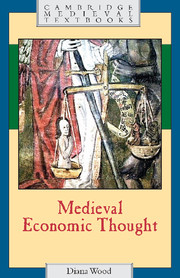Book contents
- Frontmatter
- Contents
- Preface
- List of abbreviations
- Introduction: problems, evidence, and background
- 1 Private property versus communal rights: the conflict of two laws
- 2 Wealth, beggary, and sufficiency
- 3 What is money?
- 4 Sovereign concerns: weights, measures, and coinage
- 5 The mercantile system
- 6 The just price and the just wage
- 7 The nature of usury: the usurer as winner
- 8 The theory of interest: the usurer as loser
- Conclusion
- Appendix: Notes on the main writers and anonymous works mentioned in the text
- Glossary of terms
- Select bibliography
- Index
- Cambridge Medieval Textbooks
1 - Private property versus communal rights: the conflict of two laws
Published online by Cambridge University Press: 05 June 2012
- Frontmatter
- Contents
- Preface
- List of abbreviations
- Introduction: problems, evidence, and background
- 1 Private property versus communal rights: the conflict of two laws
- 2 Wealth, beggary, and sufficiency
- 3 What is money?
- 4 Sovereign concerns: weights, measures, and coinage
- 5 The mercantile system
- 6 The just price and the just wage
- 7 The nature of usury: the usurer as winner
- 8 The theory of interest: the usurer as loser
- Conclusion
- Appendix: Notes on the main writers and anonymous works mentioned in the text
- Glossary of terms
- Select bibliography
- Index
- Cambridge Medieval Textbooks
Summary
INTRODUCTION: DEFINITIONS AND PROBLEMS
‘Since all things are common by God's law and by law of nature, how may any man be lord of anything more than another?’ mused Dives, the rich man, in the early fifteenth-century treatise Dives and Pauper. The question was not a new one, and this chapter will examine various answers which were suggested, either by groups or individuals, to the disagreement between divine-natural law and human law. By the law of God and nature all things were given to everyone in common; by human law things were owned individually and divided unequally. Was it possible to reconcile these two extreme positions – to find a mean between them? Some solutions to be examined here were purely theoretical; others, from late medieval England, were both theoretical and practical. Before investigating them, however, property, the origin and basis of all economic life and attitudes, needs to be defined.
Property can be seen as the means to sustain life and as something to be enjoyed and shared. It can also be seen as the object of human greed, and its possession as a title to riches and to power over others. Medieval thinkers considered that both property and the subjection of one person to another were the result of sin. In Paradise there was no private property, for everything was held in common, and the fruits of the earth were naturally shared.
- Type
- Chapter
- Information
- Medieval Economic Thought , pp. 17 - 41Publisher: Cambridge University PressPrint publication year: 2002
- 1
- Cited by

